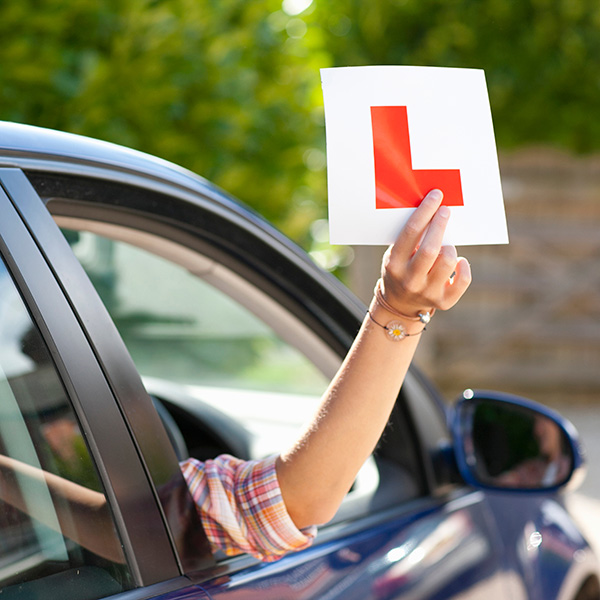The cost of learning to drive
Learning to drive is a rite of passage to becoming an adult, but it can get expensive when you add up all the costs.
In this article, we break down everything involved in the total cost of learning to drive and becoming road-ready, and share some tips to help save you money.
How much does it cost to learn to drive?
The answer isn't so simple. There are many different expenses involved in the process, and these expenses can vary depending on where you live and what options you have available to you, making the total cost of learning to drive different for everyone.
There are also many ways to save money as a learner driver, so we’ve broken down the costs into a lower average cost and a higher average cost. We’ll then explain what these costs mean and how exactly you can save yourself some cash.
| Lower average | Higher average | Differences | |
|---|---|---|---|
| Provisional licence | £34 | £43 | You can apply online or by post |
| Driving lessons (per hour) | £30 | £45 | Prices vary per region |
| Driving lessons (total) | £1,410 | £2,115 | Based on 47 lessons bought in bulk, which is the DVSA’s average recommended number |
| Theory test | £23 | £23 | |
| Theory learning materials | £16.99 | £26.97 | You can read two out of three books online for free, or buy them all new |
| Driving test | £62 | £75 | Taking your driving test on a weekday is cheaper than doing it on a weekend, evening or on a bank holiday. |
| Driving licence | £0 | £17 | Free, if you don’t mind keeping the same photo that’s on your provisional licence |
| First car | £0 | £3,592 | You could drive your parents' car or buy your own car |
| Insurance | £542 | £1,917 | Marmalade Pay As You Go Insurance on a parents' car compared to the average price of young driver insurance for the driver's own car |
| Final costs | £2,117.99 | £7,853.97 |
Provisional licence cost
Apply online: £34
Apply by post: £43
In order to get behind the wheel as a learner driver, whether you’re paying for lessons or being taught by someone you know, you’ll need to get a provisional licence.
How to save
To save yourself £9, simply apply online for your licence as it’s more expensive to apply by post.
The cost of driving lessons
Driving lessons (per hour): between £30 and £45
Driving lessons (total cost for 47 lessons): between £1,410 and £2,115
When adding up the total cost of learning to drive, driving lessons could be one of your biggest expenses. Research by insurance website Nimblefins found that the average price of driving lessons depends on where you live. If you’re in the Midlands, for example, you should be paying quite a bit less than learner drivers in Scotland.
Your cost per hour will also go down if you buy your lessons in bulk, with an average 10% discount on packages of 10 hours. The Driver and Vehicle Standards Agency (DVSA) found that it takes around 47 lessons for a learner driver to pass their driving test.
You could also learn to drive by being supervised by a suitable adult in their own car, but this isn’t as cheap as you might think. You’d have to get insured as a learner driver on that person’s car and might need to help pay for fuel.
Plus your driving supervisor might not be as good at teaching as a professional driving instructor!
How to save
Buy your driving lessons in bulk. You don’t have to commit to a full package of 40 hours from the get-go, but even packages of 10 hours, when added together, can save you a lot of money in the end.
Shop around for cheaper lessons and consider having driving lessons in a neighbouring region if they’re cheaper and you’re close enough to get there easily.
Theory test cost
Theory test: £23
Learning materials: between £16.99 and £26.97
Your theory test will cost you £23, and you have to pass it in order to take your practical driving test.
The questions in your theory test will be based off these three books:
You can read “The Highway Code” and “Know your traffic signs” for free online, but if you decide to buy them so you can study on the go they’ll cost you £4.99 each. The third book, “Driving - the essential skills”, isn’t available to read online but you can buy it for £16.99.
How to save
Read what you can for free online and try to find a second-hand copy of “Driving - the essential skills”.
If you do this, make sure to check that the version you’re buying is the current one, as changes in legislation or even error corrections from previous editions could be the difference between passing or failing your test!
You could try asking a friend who has already passed their theory test if you could borrow their book.
Driving test cost
Weekdays: £62
Evenings and weekends: £75
While a driving test taken on a weekday will cost you £62, taking it on an evening, weekend or bank holiday will set you back £75.
Driving test centres aren’t always open on evenings and weekends, so if you won’t be able to take it on a weekday because of work or other commitments, make sure you book your test in advance so you don’t miss out on your preferred date.
How to save
Don’t take the test until you’re absolutely ready, as you’ll have to pay the full amount to rebook it if you fail the first time. If you can, book it for a weekday to save yourself £13.
Driving licence cost
Without a new photo: Free
With a new photo: £17
Once you pass your theory and practical tests, you’ll actually get your driving licence for free, as long as you’re happy to keep the same photo you used in your provisional licence.
If you’d like to have a new photo on your driving licence then that will set you back £17.
How to save
Stick with the photo on your provisional licence to save yourself £17.
The cost of your first car
Average cost: £3,592
This is going to be the most expensive part of the total cost of learning to drive. Whether you go for an older, second-hand car or a shiny new model straight out of the factory, you should expect to spend upwards of £3,000 on your first car.
There are many ways to save money when it comes to buying your first car, but be wary of buying a very old car for a much cheaper price, such as under £1,000, as it can mean you’re paying more for running costs and repairs. An older car will need more care, be more prone to breaking down and will also emit higher levels of CO2, which means you will pay higher car tax.
How to save
You can get behind the wheel without spending anything on a new car by talking to your parents about driving theirs. In that case, all you have to pay for is insurance and potentially fuel and road tax.
This will help you get started on the road, gain some valuable experience and confidence as a driver and start earning your no claims discount.
Young driver car insurance cost
Pay as you go, on your parents’ car: £542
Average, on your own car: £1,917
Car insurance for first time drivers is expensive and will be one of your main costs after buying a car. This is because you don’t have an insurance record yet, so you won’t get a no claims discount. On paper, you’re not an experienced driver, so insurance companies will see you as high risk.
Research by Consumer Intelligence found that the average price for car insurance for first-time drivers is around £1,917, on your own car. You can bring the price down by choosing a black box insurance policy, where your driving is monitored in real-time. If you drive safely and carefully, your premiums will go down over time.
If you decide to drive your parents’ car, you can get Named Driver Insurance, which runs much cheaper than getting insured on your own car as a young driver. Marmalade’s Pay As You Go Named Young Driver insurance will run you about £542 and any claims you make won’t affect your parents’ insurance policy.
How to save
If you’ve decided to get your own car, look into black box insurance, which tracks your driving in real time. You can get the price of your insurance to go down simply by driving carefully.
If you’ve talked to your parents about getting insured to drive their car, pay as you go insurance means you only pay for the miles you drive, which is ideal if you’re sharing a car. You’ll also be earning your no claims discount in the meantime so when you do get your own car in the future your insurance will be cheaper.
The total cost of learning to drive
Lower average: £2,117.99
Higher average: £7,853.97
Though there are some things you can’t really save on and you’ll always have to spend quite a bit as a learner driver, there are many ways you can bring down the cost of learning to drive.
Getting out there on the road for the first time is a great achievement. Being able to drive, even if you live in an area with good public transport, can open many doors for you - you can look for jobs that are a bit farther away, take weekend trips with friends and even be of vital help in an emergency.

Ready to get behind the wheel?
Have you heard of Marmalade?
Marmalade is a car insurance provider designed especially for young drivers, whether they've passed their test or not. It offers pay as you go insurance, which you can use on your parents' car, and black box insurance for insuring your own car.

Get started on the road
You may also be interested in:
7 student budget hacks for saving money at university
It's easy to lose track of your spending if you’re not used to managing your finances. We've put together some tips to make your money go further at university.
5 reasons you should get insured on your parent’s car
You just passed your driving test but don’t yet have your own car, so how can you start driving? Find out the benefits of getting insured on your parents' car!
Side hustles for teens
Don’t let your age hold you back! There are many ways you can get some extra money in your pocket as a young person, and we’ve listed some of the best ones.
Top 5 money management tips for teens
Learning to budget and make a plan to grow your money at a young age can help protect you financially in the future.
